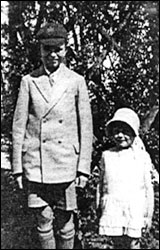| Written by Stan Simons 1999, reproduced by kind permission of his daughter Diana Glasspool. |
||||||
|
||||||
|
I never knew my brother Reginald as he died whilst still an infant in 1910. My sister Marjorie (Madge) was born on the 7th August 1911 and my sister Kathleen (Kitty) on the 4th March 1914. Sadly she died from lung cancer on the 12th August 1980, never having smoked a cigarette in her life. She had only recently received a pension of 3d (1.5p) a week.
The front room of Hopscotch was another game. We also organised teams on roller skates to play hockey up and down the street, using walking sticks in lieu of the proper sticks. The prizes for all games were either marbles or cigarette cards. Most marbles were insignificant, small and made of clay. The best were made of glass (glarnies) with colours running through them. Cigarette cards were highly prized and eternal swapping took place. One way of winning them was leaning them against a wall and flicking others at them. If you were lucky and knocked one down it was yours. Collecting sets of cigarette cards is something we all used to do; getting the last one to make up the set was most difficult - I think the manufacturers held them back. The most beautiful were made of silk, I believe from Passing Cloud cigarettes. These were scented, a mixture of colours with gold coloured tips. In those days there were machines in the street dispensing a packet of two cigarettes for two old pence. I had a happy childhood and used to keep bantams, also rabbits. At one time, whilst sick in bed, Mum made me a custard pie from bantam eggs. She lay it by the side of me but by the time I went to eat it the cat had got it. One day my Mum had put some water in the frying pan and heated it up on the gas-stove to clean it. She then had to transfer the boiling liquid from the stove to the sink, on the other side of the kitchen. I tried to run under as she was doing it and it went all down my neck and back. So I was back to bed with my injuries. My only consolation was I was given a little sailing boat, about 12 inches long. Cheeking my Mum one day she chased me round the garden, but I was faster than she was. She had a sweeping brush in her hand and in desperation threw it at me. Bulls-eye, straight on the top of my head, knocking me unconscious. When I woke up she was cradling me in her arms and flooding tears. Shopping was at the 'Co-Op' in Sugar was dispensed in blue bags each weighing two pounds. Butter in large amounts were cut, shaped with a wooden stick, weighed and wrapped. Each week Mum would write out her normal requirements in a little book and the items would then be delivered, free of charge. The milkman would come round with his steel container and different size ladles. They held either a quarter, half or full pint. The milk you ordered was then poured into your jug. Meat was always bought direct from the butchers. We had a wooden box with a metal mesh front to try and keep food fresh. I don't think refrigerators had been invented. In the summer milk was put into a container and this was then placed in a red clay container. Water was poured on this and somehow it kept it cool. Monday was wash day. Clothes were boiled in a copper in the corner of the kitchen. Dad used to bring home some leather bits to stoke the fire. Then the clothes were put into the dolly tub and pounded with a three-legged wooden stick.After this they went through a large mangle with two rollers. I usually had to operate this and caught my finger in it once. I hated Mondays; it was the washing smell. I mustn't forget the little blue bag thrown in to make clothes white; heaven knows what was in it. In those days the rag and bone man would come down the street, calling his wares. For some old clothes you could either get a little windmill on a stick or a goldfish. You had to supply your own jar. Smallpox was the scourge and it was compulsory to be vaccinated unless your parents opted out. Mine did, but I still remember black vans coming down the street, collecting the dead. We were hustled indoors if a black van appeared. Town fairs were, and still are, very popular. They always had a boxing booth where pugilists invited anyone in the audience to fight them. Those brave enough to do so never won. I watched one fight where a boxer with a cauliflower ear had it smashed and blood flowed in a copious amount. I went outside and was violently sick. Come November 5th we would buy penny jumping jacks and throw them at the girls’ feet. Also penny bangers called Little Devils. A favourite trick was to tie a piece of strong string to adjoining neighbours' front door knobs and the throw a banger through one of their letterboxes. Any one could buy fireworks. |
||||||
|
||||||
